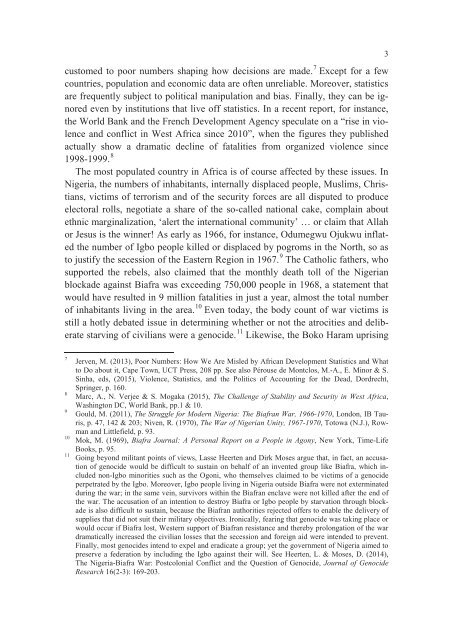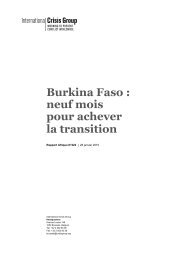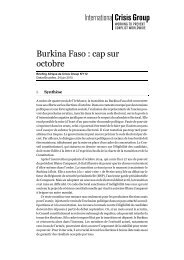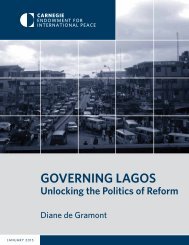Violence in Nigeria
ASC-075287668-3743-01
ASC-075287668-3743-01
You also want an ePaper? Increase the reach of your titles
YUMPU automatically turns print PDFs into web optimized ePapers that Google loves.
customed to poor numbers shap<strong>in</strong>g how decisions are made. 7 Except for a few<br />
countries, population and economic data are often unreliable. Moreover, statistics<br />
are frequently subject to political manipulation and bias. F<strong>in</strong>ally, they can be ignored<br />
even by <strong>in</strong>stitutions that live off statistics. In a recent report, for <strong>in</strong>stance,<br />
the World Bank and the French Development Agency speculate on a “rise <strong>in</strong> violence<br />
and conflict <strong>in</strong> West Africa s<strong>in</strong>ce 2010”, when the figures they published<br />
actually show a dramatic decl<strong>in</strong>e of fatalities from organized violence s<strong>in</strong>ce<br />
1998-1999. 8<br />
The most populated country <strong>in</strong> Africa is of course affected by these issues. In<br />
<strong>Nigeria</strong>, the numbers of <strong>in</strong>habitants, <strong>in</strong>ternally displaced people, Muslims, Christians,<br />
victims of terrorism and of the security forces are all disputed to produce<br />
electoral rolls, negotiate a share of the so-called national cake, compla<strong>in</strong> about<br />
ethnic marg<strong>in</strong>alization, ‘alert the <strong>in</strong>ternational community’ … or claim that Allah<br />
or Jesus is the w<strong>in</strong>ner! As early as 1966, for <strong>in</strong>stance, Odumegwu Ojukwu <strong>in</strong>flated<br />
the number of Igbo people killed or displaced by pogroms <strong>in</strong> the North, so as<br />
to justify the secession of the Eastern Region <strong>in</strong> 1967. 9 The Catholic fathers, who<br />
supported the rebels, also claimed that the monthly death toll of the <strong>Nigeria</strong>n<br />
blockade aga<strong>in</strong>st Biafra was exceed<strong>in</strong>g 750,000 people <strong>in</strong> 1968, a statement that<br />
would have resulted <strong>in</strong> 9 million fatalities <strong>in</strong> just a year, almost the total number<br />
of <strong>in</strong>habitants liv<strong>in</strong>g <strong>in</strong> the area. 10 Even today, the body count of war victims is<br />
still a hotly debated issue <strong>in</strong> determ<strong>in</strong><strong>in</strong>g whether or not the atrocities and deliberate<br />
starv<strong>in</strong>g of civilians were a genocide. 11 Likewise, the Boko Haram upris<strong>in</strong>g<br />
3<br />
7<br />
8<br />
9<br />
10<br />
11<br />
Jerven, M. (2013), Poor Numbers: How We Are Misled by African Development Statistics and What<br />
to Do about it, Cape Town, UCT Press, 208 pp. See also Pérouse de Montclos, M.-A., E. M<strong>in</strong>or & S.<br />
S<strong>in</strong>ha, eds, (2015), <strong>Violence</strong>, Statistics, and the Politics of Account<strong>in</strong>g for the Dead, Dordrecht,<br />
Spr<strong>in</strong>ger, p. 160.<br />
Marc, A., N. Verjee & S. Mogaka (2015), The Challenge of Stability and Security <strong>in</strong> West Africa,<br />
Wash<strong>in</strong>gton DC, World Bank, pp.1 & 10.<br />
Gould, M. (2011), The Struggle for Modern <strong>Nigeria</strong>: The Biafran War, 1966-1970, London, IB Tauris,<br />
p. 47, 142 & 203; Niven, R. (1970), The War of <strong>Nigeria</strong>n Unity, 1967-1970, Totowa (N.J.), Rowman<br />
and Littlefield, p. 93.<br />
Mok, M. (1969), Biafra Journal: A Personal Report on a People <strong>in</strong> Agony, New York, Time-Life<br />
Books, p. 95.<br />
Go<strong>in</strong>g beyond militant po<strong>in</strong>ts of views, Lasse Heerten and Dirk Moses argue that, <strong>in</strong> fact, an accusation<br />
of genocide would be difficult to susta<strong>in</strong> on behalf of an <strong>in</strong>vented group like Biafra, which <strong>in</strong>cluded<br />
non-Igbo m<strong>in</strong>orities such as the Ogoni, who themselves claimed to be victims of a genocide<br />
perpetrated by the Igbo. Moreover, Igbo people liv<strong>in</strong>g <strong>in</strong> <strong>Nigeria</strong> outside Biafra were not exterm<strong>in</strong>ated<br />
dur<strong>in</strong>g the war; <strong>in</strong> the same ve<strong>in</strong>, survivors with<strong>in</strong> the Biafran enclave were not killed after the end of<br />
the war. The accusation of an <strong>in</strong>tention to destroy Biafra or Igbo people by starvation through blockade<br />
is also difficult to susta<strong>in</strong>, because the Biafran authorities rejected offers to enable the delivery of<br />
supplies that did not suit their military objectives. Ironically, fear<strong>in</strong>g that genocide was tak<strong>in</strong>g place or<br />
would occur if Biafra lost, Western support of Biafran resistance and thereby prolongation of the war<br />
dramatically <strong>in</strong>creased the civilian losses that the secession and foreign aid were <strong>in</strong>tended to prevent.<br />
F<strong>in</strong>ally, most genocides <strong>in</strong>tend to expel and eradicate a group; yet the government of <strong>Nigeria</strong> aimed to<br />
preserve a federation by <strong>in</strong>clud<strong>in</strong>g the Igbo aga<strong>in</strong>st their will. See Heerten, L. & Moses, D. (2014),<br />
The <strong>Nigeria</strong>-Biafra War: Postcolonial Conflict and the Question of Genocide, Journal of Genocide<br />
Research 16(2-3): 169-203.






